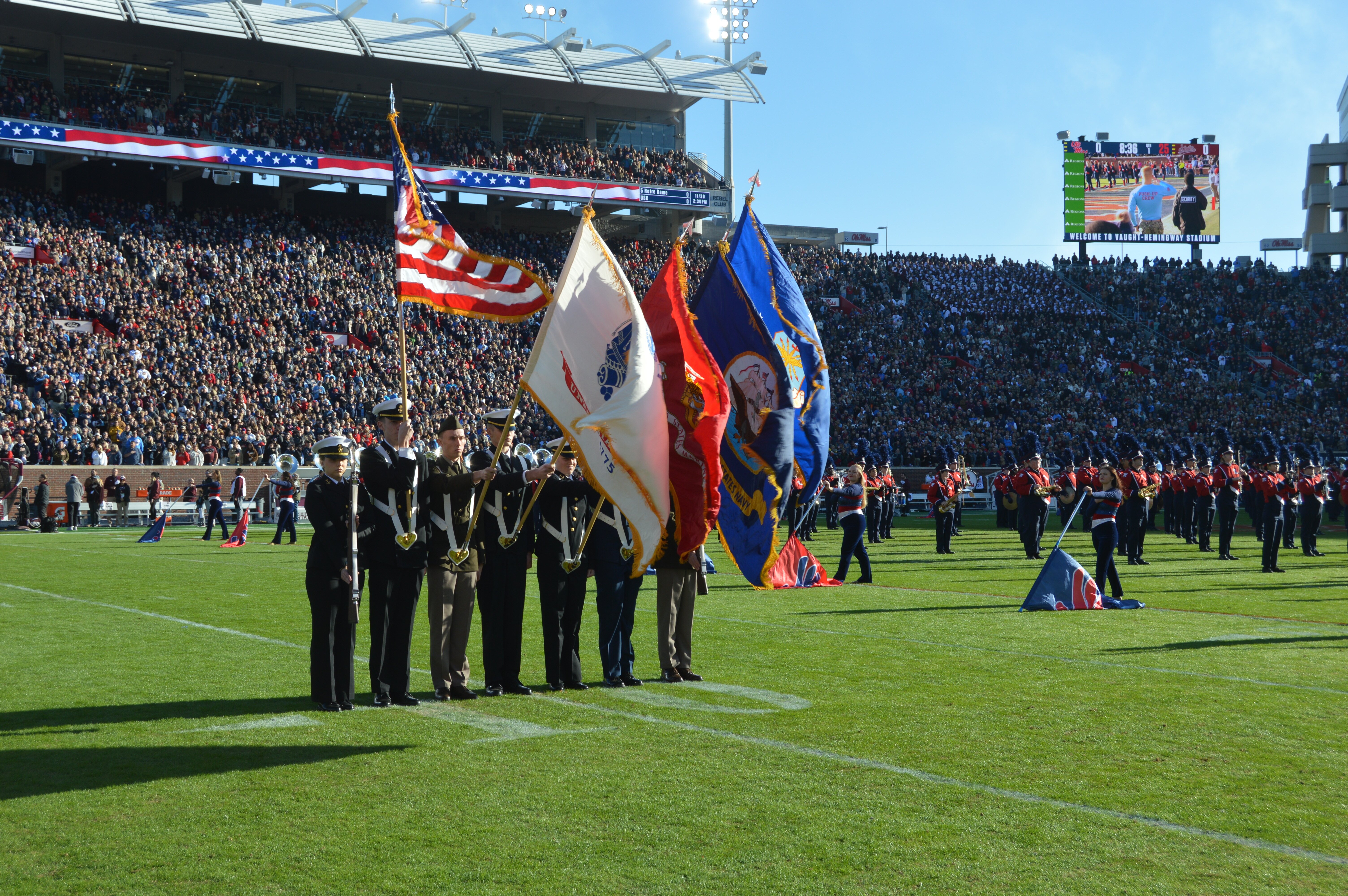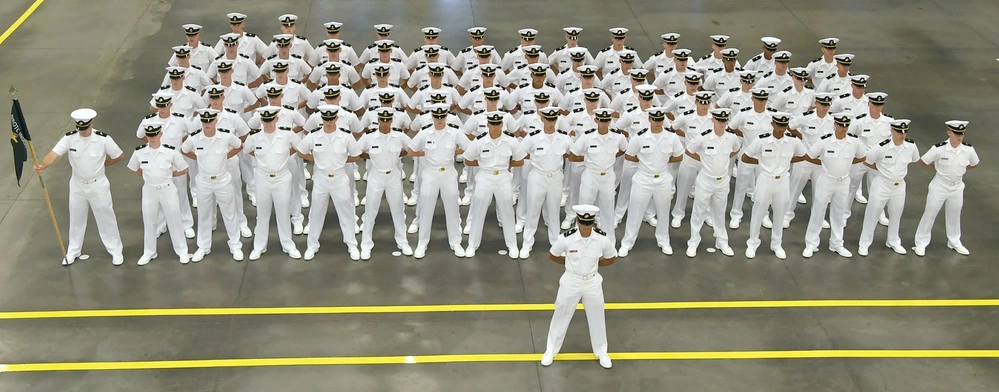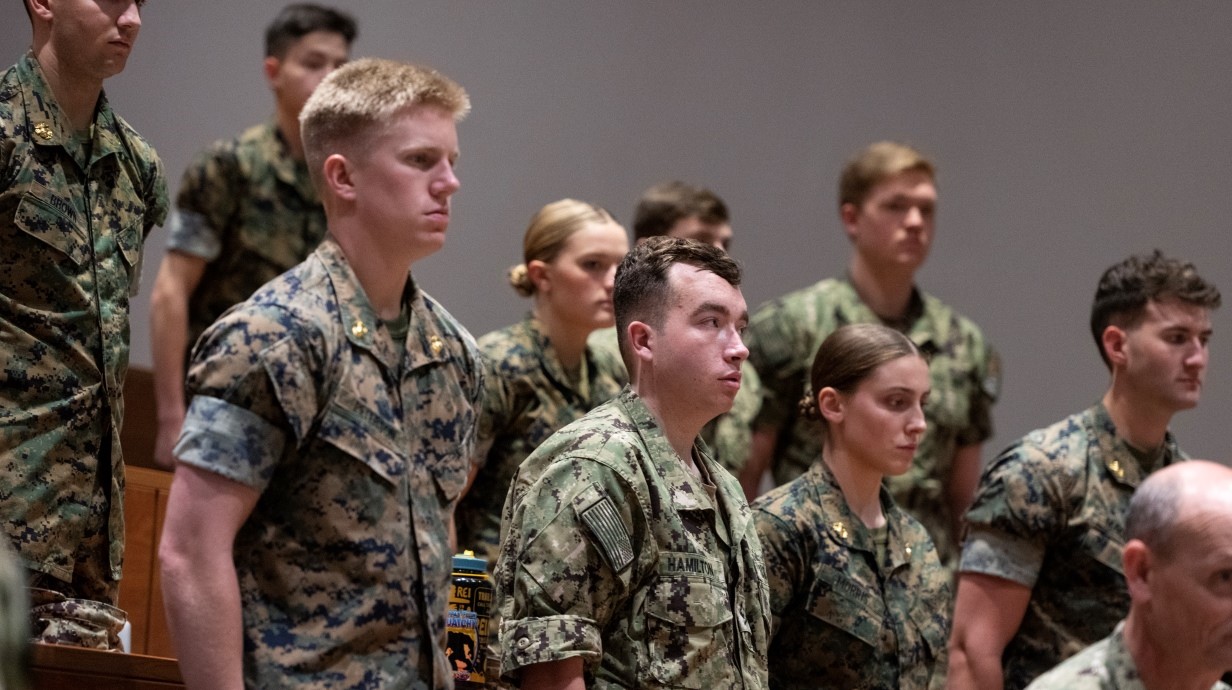Prospective Students
Welcome to the University of Mississippi NROTC Program

Your future on our country's premier Warfighting Team
Whether interested in the Navy or the Marine Corps, there are several opportunities to become a leader in our nation's military. NROTC teaches not just the academic aspects of a military career but also the practical values of honor, courage, and commitment.
Starting Your Journey As An Officer

New Student Indoctrination (NSI)
New Student Indoctrination is a comprehensive 3-week program at Naval Recruit Training Command Great Lakes, Illinois designed to introduce Midshipmen to the structure, expectations, and values of the NROTC program and our country's Navy and Marine Corps. This can occur during the summer before or after freshman year.

New Student Orientation (NSO)
New Student Orientation is a week-long orientation for all new Midshipmen when they arrive at Ole Miss. They become familiarizaed with day-to-day life in NROTC as well as get to know their leadership and fellow Midshipmen.
The College Program
The College Program is an alternative route into the the NROTC program without a scholarship. It is for individuals who were not selected for or did not apply for the National Scholarship. Individuals can apply for the College Program at any time and receive no monetary benefit from being in the program, but are supplied all uniforms.
To be eligible for enrollment in the College Program, an applicant must meet the following requirements:
- Be motivated to serve as a commissioned officer in the Naval service;
- Be a U.S. or naturalized citizen or have submitted naturalization paperwork;
- Be accepted/enrolled as a full-time student at the University of Mississippi;
- Have no apparent physically disqualifying factors based on a review of the Report of Medical History DD Form 2807-1;
- Have the ability to meet the height/weight requirements and pass the Navy Physical Readiness Test (Requirements can be found here) or Marine Corps Physical Fitness Test;
- Have no felony conviction or conviction by courts-martial;
- Not be awaiting criminal trial or sentencing, or be under any other type of military or civil restraint as a result of violation of law or regulation, or have been convicted of an offense the nature of which renders the applicant unfit for commissioned service;
- Applicants must have one of the following minimum test scores: 22 – ACT (composite), 1000 – SAT (math and critical reading combined), or a 74 – Armed Forces Qualification Test (AFQT).
- Meet Department of the Navy requirements concerning use of drugs or alcohol;
- Have no body piercings and tattoos that violate Navy or Marine Corps policy, as applicable;
- Have at least six semesters of college coursework remaining until they receive a degree;
- Have no moral obligations or personal convictions that will prevent bearing of arms and supporting and defending the Constitution of the United States against all enemies, foreign and domestic or to taking an oath to perform such acts; and
- Be at least 17 years of age on or before 1 September of the year of enrollment and less than 27 years of age on 31 December of the year an applicant expects to graduate, complete all NROTC training requirements, and be commissioned. Those with prior or current active duty in the Armed Forces may be granted age waivers equal to the number of months served. Those granted the maximum age waiver must not have reached their 30th birthday by 31 December of year graduation and commissioning are anticipated.
The University of Mississippi NROTC’s Commanding Officer is authorized to select students for the College Program.
If you are interested in the college program for this year, even if the due date is past, call or email the Ole Miss NROTC unit with your questions.
STEP 1: Download and fill out the following forms:
- College Program Application
- Report of Medical History Form
- Sports Physical Exam Form
- Drug and Alcohol Understanding
- Drug Statement for NROTC Application
- AFA Scores (Navy) or PFT Scores (Marines)
- NROTC AFA Scoresheet
Step 2: Submit the completed forms via upload:
Completed application forms may also be submited to our staff via email: nrotc@olemiss.edu.
U.S. Navy Careers
Navy officers operate in a global domain, leading operations on ships, submarines, or aircraft, and managing missions involving diplomacy, humanitarian aid, or combat.
U.S. Marine Corps Careers
Marine Corps officers are trained to excel in leadership roles in a variety of environments, from combat operations to logistics and intelligence. They can specialize in fields such as infantry, aviation, engineering, and cyber operations.
Aviation Maintenance Officer – 6002. Aviation Maintenance Officers supervise the maintenance of aircraft and aviation equipment. Their duties ensure that all Marine Corps aircraft are ready to fly to support any mission. These officers are in charge of aircraft inspection, managing technical training and administering safety programs.
Aviation Supply Officer – 6602. Aviation Supply Officers make critical decisions concerning budget, inventory management, deployment, personnel and other support matters. They serve in the Aviation Supply Department at any one of the 11 different Marine Aviation Logistics Squadrons (MALS), all dedicated to keeping Marine aircraft ready and safe.
Aviation Command and Control – 72. Officers in Aviation Command & Control serve as either Air Support Control Officers, Air Defense Control Officers or Air Traffic Control Officers. The primary functions of these MOSs include directing the interception of hostile aircraft and coordinating employment of surface-to-air-missiles, coordinating air support missions and directing activities related to air traffic control and airspace management.
Pilots and Naval Flight Officers – 75. Naval Flight Officers (NFOs) operate the advanced weapons and electronic systems on board F/A-18 Hornets and EA-6B Prowlers. The division of labor between the pilot and the NFO allows the pilot to focus on flying the aircraft and the NFO to focus on the weapons systems. The NFO often has the best situational awareness of the battlefield, and at times leads entire aviation missions.
Judge Advocate – 4402. Soon after becoming a Marine Corps Judge Advocate, you will be given the responsibilities of maintaining your own caseload and advising Marines on legal issues. Additionally, the training you receive as a Marine Corps Officer will prepare you to be a leader, both inside the courtroom and out.
Public Affairs Officer – 4302. Public Affairs Officers communicate the mission and interests of the Marine Corps to diverse stakeholders. These officers answer questions and inform the media of Marine Corps stories and events. They fulfill requests for aircraft, military bands, color guards and speakers. In addition, they write articles, publish base newspapers and manage websites. This profession is relatively small in respect to other MOSs but has a significant supporting staff role among all levels of command.
Infantry Officer – 0302. Infantry Officers are central to the role of the Marine Corps as an expeditionary force. They are responsible for training their Marines for every variety of ground combat mission in any environment. They gather and evaluate intelligence on enemy forces, develop offensive and defensive battle plans and command their infantry unit’s use of weapons and equipment.
Field Artillery Officer – 0802. Field Artillery Officers lead Marines in tactics, gunnery, gun-line drills, communications, maintenance, transportation and logistics. They provide close-fire support for infantry, armored reconnaissance and tank units. Their first assignment is to a firing battery within an artillery battalion, while future roles include fire support officer, fire direction officer, platoon leader and battery executive officer.
Amphibious Assault Vehicle Officer – 1803. AAV officers command, or assist in commanding, assault amphibian (AA) units, provide recommendations to the supported unit commander for the tactical employment of AA units. AAV officers also direct AA units on maneuvers, tactical problems, and in combat.
Adjutant Officer – 0180. Adjutants coordinate administrative matters for Marine Corps staff sections and external agencies at the staff level. They ensure that every Marine in their command has administrative resources both for day-to-day tasks and long-term career progression. Adjutants supervise the execution of administrative policies. They receive and route correspondence, preparing responses to any special correspondence. They also manage their unit’s legal matters and monitor fitness reports, among other administrative duties.
Combat Engineer Officer – 1302. Combat Engineers lead Marines in route reconnaissance, demolitions, mine and countermine warfare, obstacle emplacement, breaching and construction. Engineering is divided into four categories: mobility, countermobility, survivability and general engineering. Officers find themselves performing many missions, such as building a bridge or repairing a medical clinic in a disaster-struck third-world country.
Communications Officer – 0602. Communications Officers are the backbone for command and control of operating forces in the Marine Corps. They are responsible for the planning, installation, operation and maintenance of data, telecommunications and computer systems. On the battlefield, officers must be able to quickly establish communications capabilities. This MOS requires officers to stay informed of rapidly evolving technology involved in their day-to-day duties.
Financial Management Officer – 3404. Financial Management Officers are in charge of financial issues, such as managing budgets and disbursing operations. Officers who work in the finance section coordinate military pay and travel, while the comptroller side consists of budgeting, accounting and leading internal reviews.
Ground Supply Officer – 3002. Ground Supply Officers lead and train Marines in coordinating the equipment and material for mission requirements. They supervise the purchasing and contracting of supplies, manage budgets and develop spending plans. Their role ensures that Marines worldwide are properly equipped.
Intelligence Officer – 02. Entry-level Marine Intelligence Officers will be given specific training within one of the following disciplines: Ground, Human Source, Signals or Air Intelligence. These officers will gain unique opportunities for leadership, deployment and training. Once the rank of Major is attained, all of the disciplines merge together as the officer becomes a Marine Air Ground Task Force (MAGTF) Intelligence Officer. After three years of experience and completion of MIOC (MAGTF Intelligence Officer Course), you will be designated as a MAGTF Intelligence Officer, with leadership opportunities in both joint and Marine Corps billets.
Logistics Officer – 0402. Logistics Officers have a high degree of visibility due to their critical role in planning strategies for every major unit in the operating forces. They perform a variety of duties including coordinating the movement of Marines and equipment from ship to shore to forward operating bases. This MOS allows officers to develop long-range projects, manage the supply chain and analyze data and performance.
Military Police Officer – 5803. Military Police Officers provide essential support to their commanding officers with all facets of law enforcement. Officers begin this MOS either on-base, providing security and law enforcement, or on deployment, supervising maneuver and mobility operations and internment operations, as well as providing area security and law enforcement.
